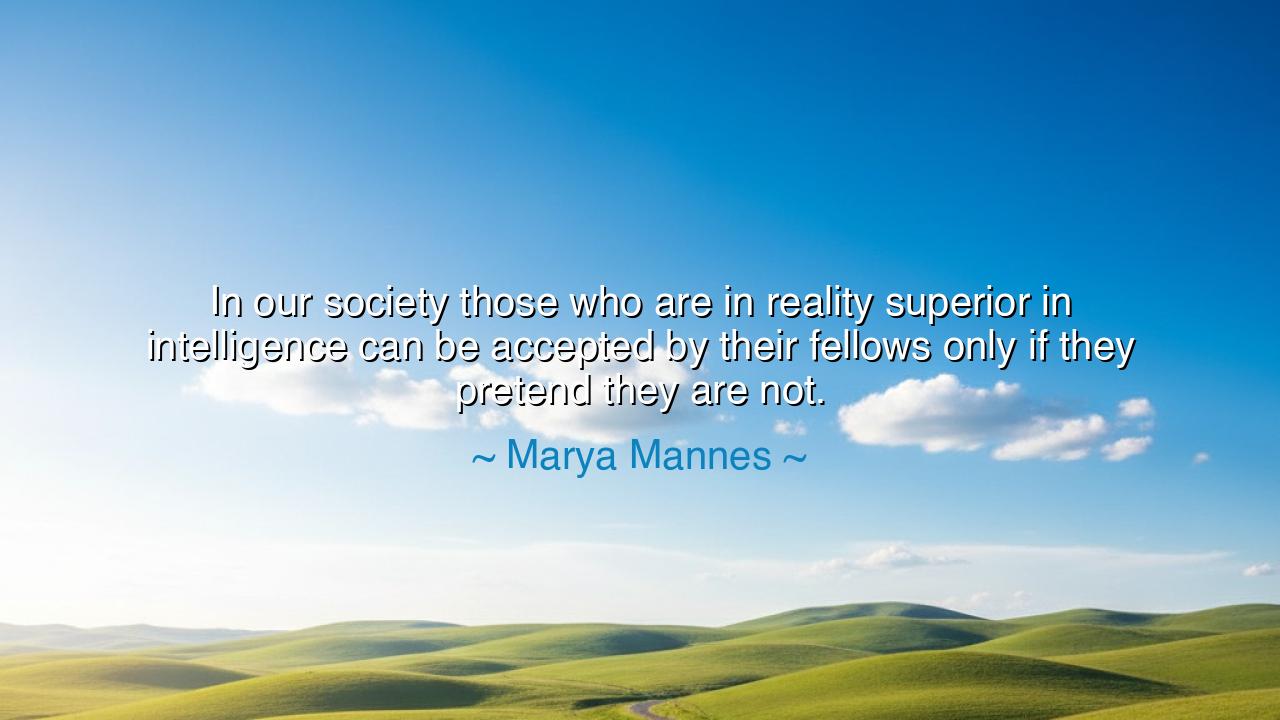
In our society those who are in reality superior in intelligence
In our society those who are in reality superior in intelligence can be accepted by their fellows only if they pretend they are not.






The words of Marya Mannes, “In our society those who are in reality superior in intelligence can be accepted by their fellows only if they pretend they are not,” echo with both sorrow and truth. Beneath their calm phrasing lies a lament for the age-old tension between wisdom and conformity, between those who see deeply and those who fear to look. Mannes, a writer of rare clarity and courage, saw that the world often celebrates mediocrity while it quietly resents excellence. Her observation is not a condemnation of the simple, but a warning to the gifted—that intelligence, if worn too openly, provokes not admiration but suspicion. For the wise, in revealing too much of their light, may blind those who dwell too long in shadow.
To understand the origin of this quote, we must understand its author. Marya Mannes was a critic, essayist, and social commentator of the mid-twentieth century—an age of both progress and pretense. Living through the turmoil of world wars and the cold discipline of conformity that followed, she witnessed how society often demanded sameness under the guise of equality. In her time, to be too bold in thought was to risk isolation; to question convention was to invite ridicule. Her words arose not from bitterness, but from clarity—the recognition that true intelligence, especially when it challenges the comfortable illusions of the many, must often disguise itself in humility to survive among them.
The wisdom she speaks of, however, is not new. The ancients knew it well. The philosopher Socrates, whose mind illuminated Athens like a torch in the dark, was sentenced to death for “corrupting the youth” simply because he dared to question, to teach men to think for themselves. He was a master of irony—pretending ignorance to expose the ignorance of others. His humility was both genuine and strategic; he understood that wisdom unmasked too abruptly provokes fear and hatred. So he hid his brilliance in simplicity, knowing that the human ego is easily wounded by truth. In this, Socrates becomes the living embodiment of Mannes’s warning: that in order to speak wisdom among men, one must sometimes pretend not to possess it.
Throughout history, this paradox has repeated itself. Consider the story of Galileo Galilei, who saw with his telescope that the Earth moved around the Sun. His intelligence pierced through the illusions of the age, yet his discovery was condemned by the powerful. To preserve his life, he was forced to recant what he knew to be true. “And yet it moves,” he is said to have whispered—a quiet rebellion of mind against fear. In that whisper lies the tragedy of every great thinker: that he must bow to ignorance for the sake of survival, that his brilliance must be veiled in humility until the world grows ready to bear it.
Mannes’s words strike at the heart of human weakness: envy. The truly intelligent do not despise the unlearned, but the unlearned often despise those who surpass them. It is not malice that drives this resentment, but the pain of comparison, the discomfort of confronting one’s own limitations. And so, society builds invisible walls to protect its comfort—it exalts the clever who amuse, the cunning who flatter, but shuns the wise who challenge and elevate. The gifted learn, then, to wear masks—to laugh softly at foolishness, to downplay insight, to speak gently where thunder would offend. In this way, intelligence survives among its fellows not through domination, but through adaptation.
Yet Mannes’s quote is not a counsel of despair. It teaches that wisdom must be both luminous and subtle. To be intelligent is not to flaunt superiority, but to guide with grace. The true sage does not wield intellect as a weapon, but as a lamp—shielded enough to light the path without blinding those who walk beside him. The challenge, then, is not to hide one’s brilliance out of fear, but to express it with humility and empathy, so that others may receive it without defensiveness. For intelligence without compassion becomes arrogance, and wisdom without patience becomes cruelty.
There is a lesson here for all who strive to live with awareness. If you are gifted with intelligence, wear it not as a crown, but as a seed. Plant it in the minds of others through kindness, through curiosity, through example. Do not shrink from your light, but temper it with warmth. And if you find yourself among those who mock what they do not understand, remember that silence can be as eloquent as speech. The wise man endures misunderstanding as the mountain endures the storm—unchanged, unbroken, and ever-reaching toward the sun.
So, my listener, carry Mannes’s truth like a torch within you: the world does not always welcome brilliance—but it needs it. Be gentle in your wisdom, but steadfast in your pursuit of truth. The greatest minds in history have walked a lonely road, yet it is their light that has led civilization forward. Pretend if you must, for survival’s sake—but never forget who you are. For though the intelligent may hide among the many, it is through their quiet strength that the world awakens, one generation at a time.






AAdministratorAdministrator
Welcome, honored guests. Please leave a comment, we will respond soon